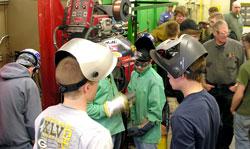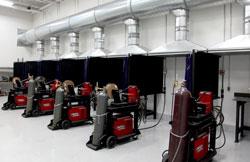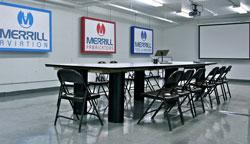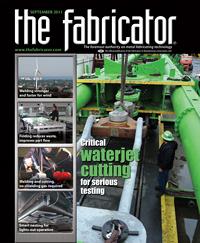Editor-in-Chief
- FMA
- The Fabricator
- FABTECH
- Canadian Metalworking
Categories
- Additive Manufacturing
- Aluminum Welding
- Arc Welding
- Assembly and Joining
- Automation and Robotics
- Bending and Forming
- Consumables
- Cutting and Weld Prep
- Electric Vehicles
- En Español
- Finishing
- Hydroforming
- Laser Cutting
- Laser Welding
- Machining
- Manufacturing Software
- Materials Handling
- Metals/Materials
- Oxyfuel Cutting
- Plasma Cutting
- Power Tools
- Punching and Other Holemaking
- Roll Forming
- Safety
- Sawing
- Shearing
- Shop Management
- Testing and Measuring
- Tube and Pipe Fabrication
- Tube and Pipe Production
- Waterjet Cutting
Industry Directory
Webcasts
Podcasts
FAB 40
Advertise
Subscribe
Account Login
Search
Waiting for welders won't work
Metal fabricators take welder training into their own hands
- By Dan Davis
- September 9, 2011
- Article
- Shop Management

Figure 1: About 50 students from nine high schools participated in the Nicolet College 2011 High School Welding Competition in March. College officials call the participation of businesses like Northstar Steel Fabricating as instrumental in helping create a welding program that can product graduates that then can get jobs with nearby manufacturers. (Photo courtesy of Nicolet College)
In early July the Wisconsin Economic Development Corp. gathered six business owners in Ashwaubenon, Wis., for a discussion on economic opportunities and challenges that they face as their companies conduct business in the state. Taxes and insurance costs obviously dominated early talk as the participants focused on their challenges, but the most spirited discussion revolved around finding talented employees.
“You need to support education in manufacturing. It’s very difficult to find workers,” John West, president of Fox Valley Metal-Tech, Green Bay, Wis., was quoted in the Green Bay Press-Gazette. “If you want to grow and grow quickly, if you bring in all green people, you are going to suffer.”
Of course, West is talking about inexperienced workers when he refers to “green,” but his point remains valid no matter the word choice. Because metal fabricating companies have lean workforces and are asking shop floor employees to assume more responsibilities, ranging from scheduling to quality control, they can’t afford to throw someone with no experience into the manufacturing fray and expect him or her to produce at similar levels of veteran employees. In fact, these newcomers to fabricating have the potential to bring a finely tuned production operation to a grinding halt. Simply put, it’s not easy being green.
In particular, metal fabricating companies are seeking welders. In a 2010 Manufacturing Job Skills Survey done for the Fabricators & Manufacturers Association’s Nuts, Bolts & Thingamajigs® Foundation, 42 percent of 185 respondents cited welding as the No. 1 manufacturing skill most difficult to hire, slightly edging out machining skills, which 40 percent of those surveyed noted as a skill difficult to find. In that same survey, 76 percent reported that “leadership” is the general business skill most difficult to hire. Leadership can mean different things to different people, but it surely reinforces the point that manufacturers aren’t just looking for a button-pusher who is more likely to be watching the clock than focusing on the job.
Where does that leave metal fabricators? Many are taking matters into their own hands.
Going Back to School
Dave Denis is in a unique position when compared to other fabricators. He’s a certified welding instructor for his family’s company, Northstar Steel Fabricating, Rhinelander, Wis., but he also helps out with welding training and human resources. But that’s not what distinguishes Denis from other metal fabricators. He also holds a technical education degree from the University of Wisconsin-Stout.
“I can see the perspective of an educator—what they are starting with, what they are trying to get out, and what I’m asking for … I understand the obstacles,” he said.
Denis, obviously, saw his company’s challenges first. Students completing the welding programs at the local community colleges didn’t possess all of the skills necessary to be productive on the shop floor immediately upon hiring. They required extensive guidance, and the company didn’t have the resources to transform senior employees into full-time trainers. Northstar’s 40-employee workforce is more focused on meeting orders for its operator cabs for off-highway equipment and other custom fabrications.
More specifically, the welding students couldn’t fabricate anything. They could “burn wire,” Denis said, but they didn’t understand how to take different parts, assemble them, and then weld the joints together to create a finished metal component.
“I don’t have a job just burning wire. That’s what robots do,” Denis said. “Nowadays you have to be the total package, and I’m trying to steer them in that direction.”

Figure 2: The welding lab at the Merrill Institute of Welding is going to look very similar to the labs that might be found at a community college. The key difference is that this school has access to the resources available to one of the largest metal fabricators in the Midwest. (Photo courtesy of Merrill Fabricators)
Instead of just waiting for a change, Denis decided to try and influence the change. Five years ago he reached out to nearby Nicolet College and helped to launch an annual welding competition. Every year Northstar offers financial support and donates materials to the competition (see Figure 1), which has grown now to include other industry sponsors such as Airgas and Fastenal. The goal was to generate interest in the industrial art among local high school students, and the organizers appeared to have achieved that. Forty-eight students competed in the contest, which is held every month.
But this isn’t just a welding contest, where judges rate the student’s metal creations. It’s a three-round affair that involves a math test, blueprint reading, and welding a 2- by 6-in. steel fabrication as directed by a Denis-prepared blueprint.
The welding competition was only the beginning. Denis now sits on the advisory board for Nicolet College’s welding program. While he is but one voice on the board, he said he has been able to encourage some new approaches in how the welding courses are taught.
For example, in an advanced welding class this summer, the students not only had the typical class and lab work, but they had to build a complex weldment—a shop cart—as part of the technical program. Northstar provided the Autodesk® Inventor® 3-D model files and shared them with the students, showing them just how most metal fabrication jobs begin.
“I told them that they could get a design review program on [the Autodesk Web site], and I would send them the model. Then they could play with the model on the computer while they were doing the project and really get an understanding from the ground up on how something is made,” Denis said.
Further along in the class, the welding students took plasma-cut parts, also provided by Northstar, and formed them up to create the cart.
Denis said his efforts have paid off because some of the recent hires from the local welding program will have a shorter learning curve than earlier hires. The new welders aren’t specifically trained for Northstar’s needs because other local companies also participate in the advisory program; as a result, they also have input in the welding processes that are learned. For example, students spend time working with stainless steel, not just carbon steel.
However, Denis said that if he can save even a little bit of time transforming a rookie welder into an unsupervised, well-rounded fabricator, then it’s been worth the effort. Typically, that transformation takes about three years.
“I’d like to get a little bit out of what we’re paying in taxes and see if we can educate these kids,” he said.
Setting up Your Own School
Merrill Fabricators, Alma, Mich., is choosing to home-school its welders. It launched the Merrill Institute of Welding this year and hopes to start developing welding talent for its current and anticipated openings, the result of large contracts with heavy equipment OEMs that will ramp up in the fall.

Figure 3: Students that join Merril Fabricators' welding school also will learn related skills such as blueprint reading in the company's classroom. (Photo courtesy of Merrill Fabricators)
The Michigan metal fabricator reached this point only after exhausting efforts to work with local workforce development officials. Chad Sibley, a contract administrator with Merrill’s parent company, Merrill Technologies, said the fabricator spent two and a half years working with a contractor affiliated with Michigan Works, an association with a mission to support Michigan’s Workforce Development System, and really didn’t see any benefit from the effort. So Merrill Fabricators built a classroom and a lab with 10 welding booths and proceeded to open the agency’s program to about 100 students.
“We only ended up hiring a total of five, and only one or two of them became welders. This has been a continuous problem,” Sibley said.
It’s become an even bigger problem as Merrill Fabricators has grown over the years, from a 20-man operation in 1995 to a 150-employee business today. With growing demand in 2011 and forecast for 2012, the company is in great need of skilled welders.
Jason North, a certified welding instructor and certified welding educator, has been on the front lines of trying to find these new welders. He’s been with Merrill Fabricators for 16 years and has witnessed the local community colleges falling behind real-world manufacturing demands.
“They are teaching them classroom-type settings and very low parameters for the weld parameters,” North said. “So when applicants come in and test with us, they really don’t know what they are in for or looking at.”
As an example, North described a typical gas metal arc welding (GMAW) test on A36 plate he gives to potential hires. The applicants set the machine at 18 V and the wire speed at 300 IPM. They successfully short-circuit transfer the weld in there, but it is hardly a desirable weld for the type of fabrications produced at Merrill Fabricators.
“They just don’t know any better. That’s a good setting for 3⁄16-inch sheet metal, but it’s not a good setting for 1-in. A36 plate,” North said.
Merrill Fabricators needs that type of varied welding background because the company is involved in so many different types of projects. Welders could be spending a tremendous amount of time working with flux-cored arc welding and then find themselves in the middle of extensive gas tungsten arc welding projects. They work mostly with carbon steel and different types of aluminum, but they also encounter exotic metals, such as INCONEL® alloys and Hastelloy®. North added that the company is about to start repairing titanium parts for the Federal Aviation Administration.
Sibley said the lack of success with the workforce development agency forced the company to rethink what it would do to help fill slots in its welding department in the future. The answer came during a defense conference last year.
The U.S. Department of Labor was offering grants through community colleges to help retrain unemployed people and prepare them for careers in the defense industry. Merrill Fabricators just happened to be involved in several defense projects.
“We are getting grant money to take 40 candidates over a year’s time and put them through our school at no expense to them. We are supplying all of the tools and all of the consumables,” Sibley said. Merrill Fabricators has even added another welding lab, complete with 10 more welding stations (see Figure 2). The school is able to accommodate 20 welders at a time in two individual sessions.
North designed the nine-week, 40-hours-per-week curriculum on the American Welding Society’s SENSE (Schools Excelling through National Skill Standards Education) program. Just like any other educational facility that is built around the SENSE structure (see Figure 3), any graduate of the Merrill Institute of Welding will be a certified entry-level welder.
These early graduates will be AWS Level 1 welders. North said the goal is to expand the program to produce more advanced welders as well—Level 2 for advanced welders and Level 3 for expert welders.
“I plan to touch on everything,” said North, who also will act as lead instructor. “It’s going to be intense. It’s not going to be the typical vocational type of school where the instructor basically says go weld on that 6-in. plate and give me a call when you are finished. We are going to be right there working with these students. We are going to be working on material ranging from 1⁄16 in. to 1-in. plate. They are going to get a broad scope of what this industry is about, and I think it will prepare them much better for the real world.”
North added that Merrill Institute of Welding also has the added benefit of having an almost unlimited supply of material. Remnants that were once destined to be hauled away as scrap now will become a valuable classroom resource.
Sibley said that having an on-site welding school at a fabricating company is beneficial for another reason: It’s easier for students to get excited about their new trade.
“How many places can you go to school and then walk through a huge fab shop and actually see huge fabrications? Really getting that opportunity to see those things while you are going to school and working in the labs means a lot,” he said.
Both North and Sibley believe this is the beginning of big things for Merrill Fabricators’ training efforts. Other companies are contacting the metal fabricator to develop training programs for their own use. Based on those experiences and its own, Merrill Fabricators management also hopes to establish an in-house training program to address another highly sought-after skill: CNC machining.
“In the end, we’re about trying to create good-paying jobs for people so that they can take care of their families,” Sibley said.
Merrill Fabricators isn’t alone in taking on this welding education initiative. To attract potential students who may be interested in a welding career, but who also may have jobs or other daily commitments, Fox Valley Metal-Tech runs late-night welding classes from 9 p.m. to 1 a.m.
These companies aren’t waiting for skilled welders to show up on their doorsteps. They now see their training efforts as being as important as their fabricating capabilities. With the impending retirement of thousands of baby boomers in the coming years, more metal fabricating companies likely will learn the same lesson.
About the Author

Dan Davis
2135 Point Blvd.
Elgin, IL 60123
815-227-8281
Dan Davis is editor-in-chief of The Fabricator, the industry's most widely circulated metal fabricating magazine, and its sister publications, The Tube & Pipe Journal and The Welder. He has been with the publications since April 2002.
subscribe now

The Fabricator is North America's leading magazine for the metal forming and fabricating industry. The magazine delivers the news, technical articles, and case histories that enable fabricators to do their jobs more efficiently. The Fabricator has served the industry since 1970.
start your free subscription- Stay connected from anywhere

Easily access valuable industry resources now with full access to the digital edition of The Fabricator.

Easily access valuable industry resources now with full access to the digital edition of The Welder.

Easily access valuable industry resources now with full access to the digital edition of The Tube and Pipe Journal.
- Podcasting
- Podcast:
- The Fabricator Podcast
- Published:
- 04/16/2024
- Running Time:
- 63:29
In this episode of The Fabricator Podcast, Caleb Chamberlain, co-founder and CEO of OSH Cut, discusses his company’s...
- Industry Events
16th Annual Safety Conference
- April 30 - May 1, 2024
- Elgin,
Pipe and Tube Conference
- May 21 - 22, 2024
- Omaha, NE
World-Class Roll Forming Workshop
- June 5 - 6, 2024
- Louisville, KY
Advanced Laser Application Workshop
- June 25 - 27, 2024
- Novi, MI































